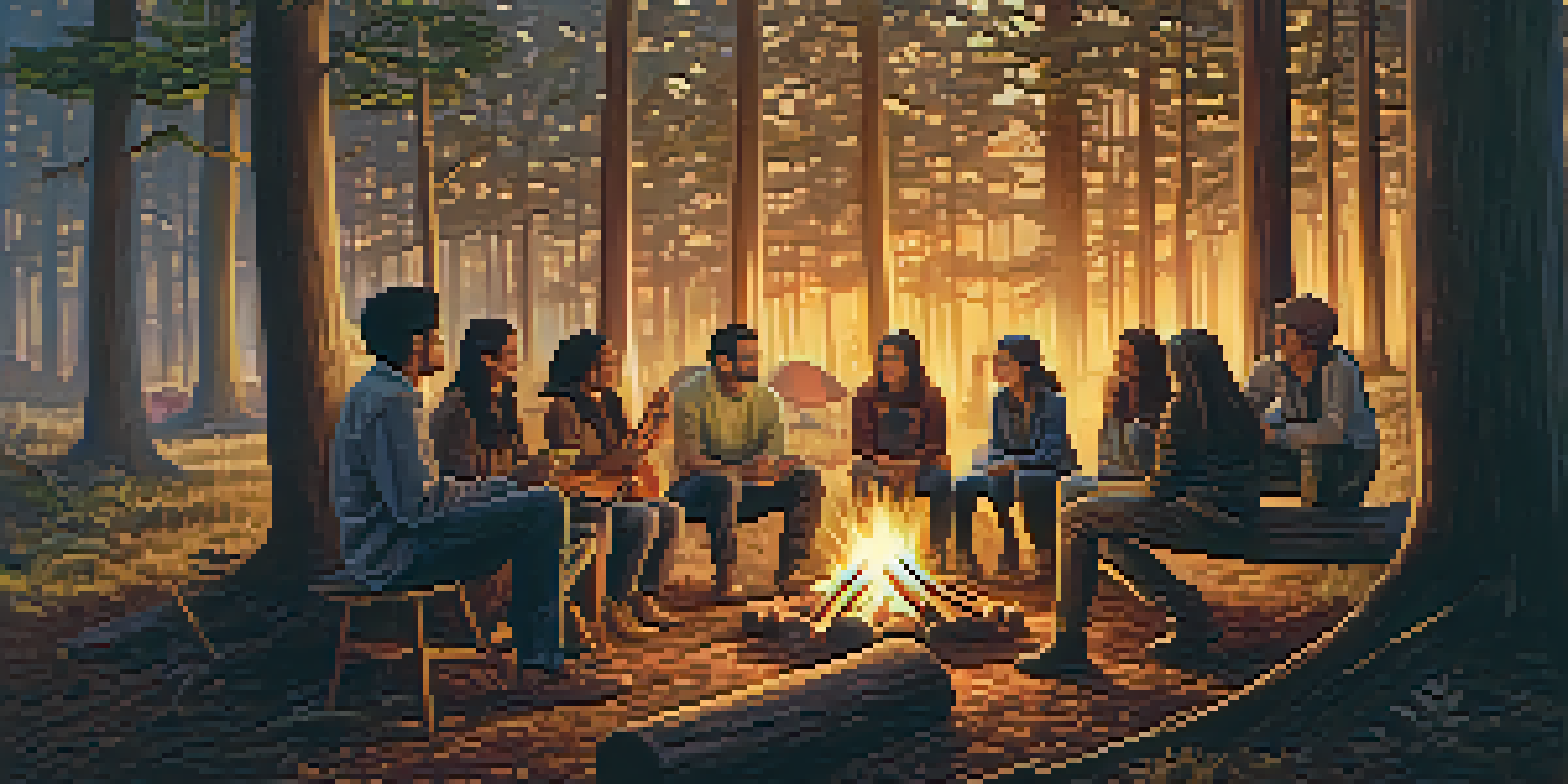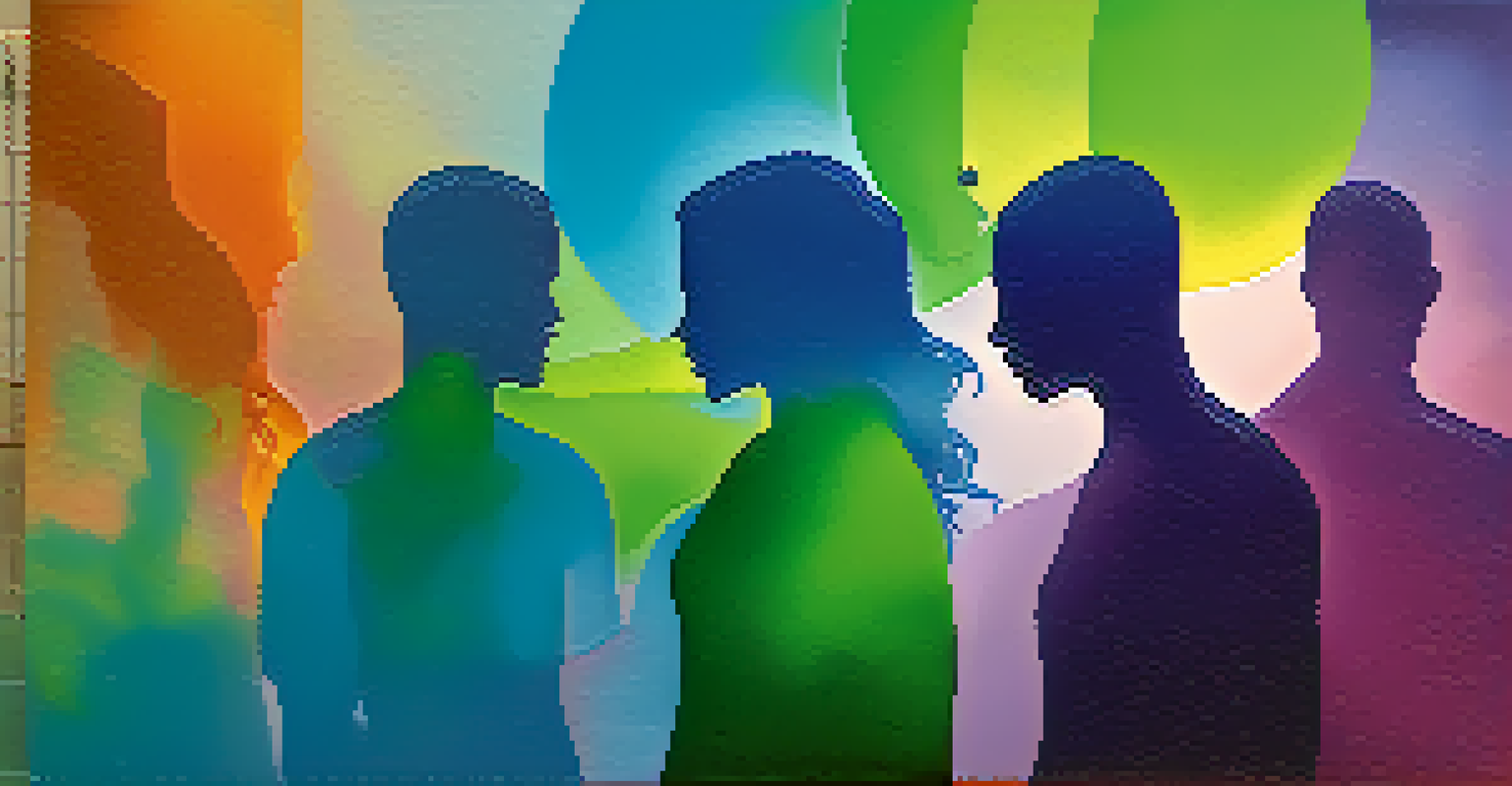How Hallucinogens Influence Group Dynamics and Relationships

Understanding Hallucinogens and Their Effects
Hallucinogens, such as LSD and psilocybin, are substances that alter perception, mood, and various cognitive processes. These psychoactive compounds can lead to profound experiences that affect individuals both internally and socially. By reshaping how people perceive reality, hallucinogens can significantly influence interactions within a group setting.
The greatest gift of life is friendship, and I have received it.
Many users report heightened emotional experiences and a sense of connection with others while under the influence of these substances. This shift in perception can foster empathy and understanding, allowing individuals to relate to one another on a deeper level. For instance, during a shared hallucinogenic experience, participants might feel a collective consciousness, blurring the lines between individual perspectives.
However, it’s important to approach these experiences with caution, as not all interactions are positive. The effects of hallucinogens can vary widely from person to person, and negative experiences can lead to misunderstandings or conflicts in group dynamics.
The Role of Shared Experiences in Bonding
Shared experiences, particularly those induced by hallucinogens, can create a strong sense of unity among participants. When individuals engage in a collective journey, such as a guided trip, they often feel bonded by the emotional highs and challenges faced together. This bonding can lead to lasting friendships or even deepen existing relationships.

For example, people often recount feeling a profound sense of love and trust for those they share these experiences with. This phenomenon can be likened to the feeling of camaraderie that develops among soldiers in a shared mission. When individuals feel vulnerable and exposed, the support they receive from others can create lasting connections.
Hallucinogens Foster Empathy
These substances can enhance emotional connections, allowing individuals to understand and relate to each other on a deeper level.
However, the intensity of these experiences can also lead to varying interpretations of the events, sometimes leading to conflict. It’s crucial to navigate these emotional waters carefully to ensure that the bonds formed are based on mutual understanding rather than solely the hallucinogenic experience.
Altered Perceptions and Conflict Resolution
Hallucinogens can provide unique opportunities for conflict resolution within groups. When participants engage with these substances, they may experience shifts in perspective that allow them to see past their differences. This newfound understanding can help diffuse tensions and foster open communication.
We are not human beings having a spiritual experience; we are spiritual beings having a human experience.
For instance, during a trip, someone might realize how a disagreement stems from misunderstanding rather than malice. This revelation can lead to heartfelt discussions that might not have occurred in a sober state. In this way, hallucinogens can act as facilitators of empathy, encouraging individuals to listen more closely to each other.
However, it’s essential to note that these experiences are not a guaranteed solution. The outcome largely depends on the environment and the individuals involved. A supportive atmosphere can lead to constructive outcomes, while a hostile one can exacerbate existing conflicts.
The Impact of Set and Setting on Group Dynamics
The effects of hallucinogens are heavily influenced by 'set and setting,' which refer to the mindset of the user and the physical and social environment in which the experience occurs. A positive set and setting can enhance feelings of connection and safety, while a negative environment can lead to anxiety and paranoia. This context is crucial for understanding group interactions.
For example, a group of friends in a familiar, comfortable space may find their relationships strengthened by shared laughter and insights. Conversely, a group in an unfamiliar or chaotic setting may struggle to connect, resulting in discomfort or conflict. The impact of these elements can significantly shape the overall experience.
Set and Setting Matter
The mindset and environment in which hallucinogens are used play a crucial role in shaping group dynamics and experiences.
Therefore, creating a conducive environment is essential for positive group dynamics when using hallucinogens. This can involve selecting a safe location, establishing ground rules, and ensuring that participants are emotionally prepared for the journey ahead.
Empathy and Perspective-Taking in Group Experiences
One of the most notable effects of hallucinogens is their ability to enhance empathy among individuals. Users often report feeling a strong connection with others, leading to greater understanding and compassion. This increase in empathy can dramatically transform group dynamics, fostering an atmosphere of support and acceptance.
When individuals can step into each other's shoes, misunderstandings are more likely to be resolved amicably. For instance, a participant might gain insight into a friend’s struggles, leading to a supportive conversation that might not have happened otherwise. This deeper level of connection can enrich relationships and promote healing.
However, this heightened empathy can also bring underlying tensions to the surface. While this can be beneficial for improving communication, it may also require careful navigation to ensure that all participants feel safe and supported during these vulnerable moments.
Potential Risks and Challenges in Group Settings
While hallucinogens can foster connection, they also come with potential risks, especially in group settings. Miscommunication and differing expectations can lead to negative experiences that strain relationships. For example, if one person has a challenging trip while others are enjoying themselves, it can create feelings of isolation or guilt.
Additionally, the unpredictable nature of hallucinogens means that not every experience will be positive or beneficial. Participants may encounter challenging emotions or face moments of paranoia, which can affect group dynamics. Such experiences can lead to misunderstandings that linger long after the effects have worn off.
Risks in Shared Experiences
While hallucinogens can strengthen bonds, they also come with potential risks, such as miscommunication and differing expectations among participants.
To mitigate these risks, clear communication and mutual consent are essential before engaging in shared experiences. Establishing a foundation of trust and understanding can help navigate any bumps along the way, ensuring that the overall experience is enriching rather than damaging.
Long-term Effects on Relationships After Use
The influence of hallucinogens on group dynamics doesn’t end once the experience is over. Many users report lasting changes in their relationships following a shared trip, often feeling more connected and open with each other. This transformation can lead to stronger bonds and improved communication in the long run.
For instance, a group of friends who have shared a profound experience might continue to engage in deeper conversations, having broken down previous barriers. They may find themselves more willing to be vulnerable and honest, creating a more supportive environment for everyone involved.

However, it’s crucial to recognize that these changes can vary widely. Some individuals may feel a disconnect after the experience, especially if their perspectives have shifted significantly. This can lead to feelings of isolation or confusion, highlighting the importance of ongoing communication in maintaining relationships.
Conclusion: The Complex Influence of Hallucinogens
In summary, hallucinogens have a unique ability to shape group dynamics and interpersonal relationships. While they can foster empathy and connection, the experiences are complex and can lead to both positive and negative outcomes. Understanding the dual nature of these substances is crucial for anyone considering shared experiences.
Navigating the world of hallucinogens requires awareness of set and setting, as well as clear communication among participants. By fostering a supportive environment and understanding potential risks, groups can maximize the positive aspects while minimizing the negatives.
Ultimately, the impact of hallucinogens on relationships is as varied as the individuals involved. With thoughtful consideration and open dialogue, these experiences can lead to profound personal growth and deeper connections within groups.